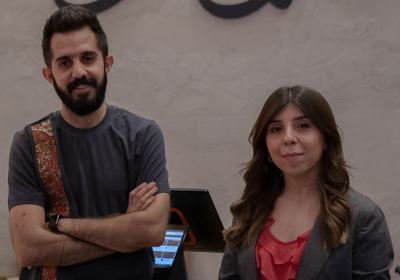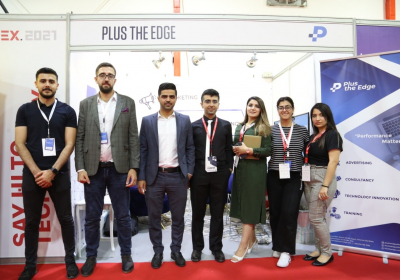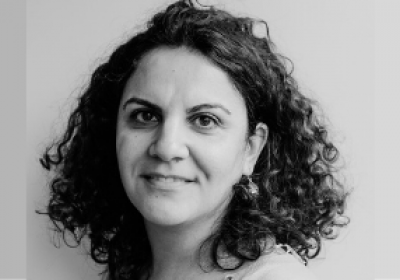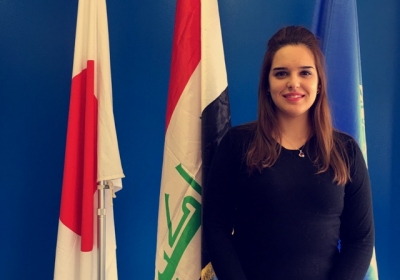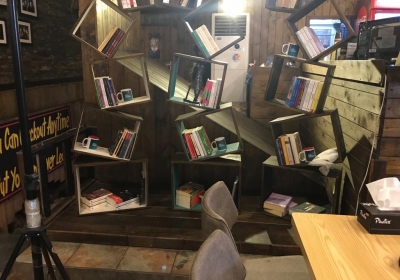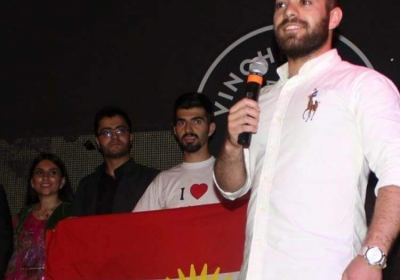AUIS Alumni Spotlight: Hayas Ismail Khayat and Hasara Ismail Khayat, co-founders of Nakhsh
Hayas Ismail Khayat (Business Administration, ‘19) and Hasara Ismail Khayat (Business Administration, ‘17) are sibling co-founders of Kurdish clothing brand Nakhsh, which prioritizes locally-produced and sourced materials. The company was founded in August 2019 and ran successfully for several months before the onset of the coronavirus pandemic. The global shutdown proved to be a serious obstacle, but the Khayats have remained passionate and are striving to achieve their ultimate goal of creating an international brand. Nakhsh attire can now reach national and international customers. They export to 14 different countries so far including the United States, Poland, Germany, United Kingdom and many more. You can find their website at: www.nakhsh.com.
The co-founders shared their experiences in entrepreneurship with the AUIS Entrepreneurship and Innovation Center (AEIC).
AEIC: Can you both introduce yourselves and tell us about the journey of getting together to start Nakhsh?
Hayas: My name is Hayas Ismail Khayat. I graduated from AUIS with a degree in Business Administration in 2019. I’ve worked in information technology-related fields with different organizations, but I am mostly interested in commercial photography and videography.
Hasara: My name is Hasara Ismail Khayat. I graduated from AUIS with a degree in Business Administration as well, but in 2017. I have personally worked in the humanitarian field with different organizations, but I am also interested in fashion and design. I am currently working as a librarian at AUIS.
Hayas originally had the idea for Nakhsh but both of us being business graduates and coming from an artistic family helped us choose this path. Our grandfather was from Khanaqin and was a very famous tailor in the region. That’s where we got our family name, Khayat, and our father, Ismail Khayat, is a well-known artist in Sulaimani.
We’ve tried to connect what we have studied with our family’s tradition and our father’s art. We both love colors and patterns due to our father’s influence on us; just like our father has tried to show Kurds’ pain and sorrows through his art, we also want to take the same path of showing the world that we exist. We have written “Made in Kurdistan” on all of our products. We believe that art can do what politics cannot, and to make change through art is a peaceful way to have a great impact.
AEIC: Can you describe your products and what Nakhsh offers?
Hasara: We design and make clothing that is a mixture between casual wear and traditional patterns. We have different collections and can take customized orders from our customers. We make shirts, jackets, and we have been working online through social media and our website.
Our designs are all customized so you won’t find them anywhere else. We make our products locally, inside Iraq and mostly in Kurdistan.
AEIC: Is Nakhsh currently online or do you have a physical store?
Hayas: We recently opened our first physical store in Sulaimani, which offers a variety of items for different genders and we offer customization in our store as well. We are located between Zargata and Baxtyari streets behind the Grand Millennium.
AEIC: How did you choose to get into the clothing business?
Hayas: I personally like colorful clothes and I see that products in the bazaar have nothing special about them. It’s hard to find unique looking pieces. We also did a survey and created some prototypes before officially launching. We saw a gap in the Kurdish market and customers' need for our items.
Hasara: I like fashion and getting to design these patterns is a big deal for Nakhsh and us. It’s our mark and we strive for perfect products; if we are not happy with an item, we won’t deliver it. We want every item to be perfectly made, with love and care, not with some machine in a factory with no special touch to it.
AEIC: What were your challenges and how did you overcome them?
Hayas: We have a hard time finding good people to work with, like tailors. We, as Nakhsh, are trying to support this talent in the region. Now that we are in the business, we see many talented people who are not well-known. We also have problems with sourcing materials since we want everything to be fully local; we don’t want to import the things we need. We continuously face the difficulty of finding good materials, like various types of fabrics, since the stocks sometimes run out.
We want our investments to stay inside the country. That’s why we want everything to be fully local. We also spend a lot of time on each piece as we want it to be perfect. Clothes are not like other items; they have to be comfortable and the customer should feel good wearing them. That’s why we take back any item and fix it based on the needs of the customer.
AEIC: How did your AUIS education help you with your business?
Hayas: Taking classes on entrepreneurship, creative coding, robotics, and interaction design helped me think more than ever and to shape my vision and ideas. I still use what I learned in these classes in my business.
Hasara: Many people have great ideas but they start without any plans and that’s why their businesses fail after a short while. Learning how to take the steps professionally and writing a business plan has helped Nakhsh to stay this strong after many difficulties.
AEIC: What advice do you have for others who have a startup or a business idea?
Hasara: As a startup, it’s important to always get feedback from trusted people and ask for guidance. It’s also important to specialize in an area, and focus on it so it can grow. It is really important to have a goal and a vision. Start with what you know and understand what you are doing and why you are doing it. Starting your own business is not easy, so stay passionate and energized and believe in your idea.
Hayas: People are so afraid to fail that they don’t even take the first step. It’s really important to know that failing is temporary but regret is forever. It’s also important to start and share your idea with the right people to get feedback as not everyone is suitable to talk to about your business idea.
AEIC: Is there anything you want our readers to know about Nakhsh?
Hasara: Yes! We give free reusable fabric bags to our customers instead of plastic bags to help guide our customers to save the beautiful environment of Kurdistan.
Hayas: We also want to thank our family and friends for supporting us and helping us on this journey.


